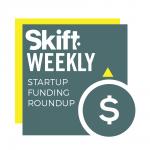Skift Take
The market for long-term business lodging is being dragged, thankfully, into the digital era by companies like 2nd Address. Plus, fundraising news for Festicket, Oaky, and Operto.

Travel Startup Funding This Week
Each week we round up travel startups that have recently received or announced funding. Please email Travel Tech Reporter Justin Dawes at [email protected] if you have funding news.
This week travel startups announced more than $18 million in funding. Earlier this week, Boeing said it had made a significant, but unspecified, investment in supersonic jet manufacturer Aerion. Here are the other travel startup fundings revealed this week.
>>2nd Address, a booking service for extended-stay rentals for business people, raised $10 million in Series C funding.
GV, the venture capital arm of Google, led the round. Foundation and Amicus also participated.
The San Francisco-based startup, founded in 2017, has raised about $22 million to date.
The company vies with Airbnb for a niche business segment in the home rental market, said CEO Chung-Man Tam. His startup helps corporate clients and employees book stays with rentals that can last more than a month in four major U.S. cities: New York, Washington, D.C., San Francisco, and Los Angeles. Tam aims to add 17 markets this year.
In Europe, it vies with Homelike, which has raised about $18 million. They both compete in parallel with the serviced apartment market, led by companies like BridgeStreet.
>>Festicket, a music festival booking portal, said it had raised $4.6m in a Series E round.
Edge Investments led the round. It was only last October that Festicket closed a $10.5 million Series D round. Festicket has raised $25 million in external funding to date.
The startup lets consumers book tickets and travel packages to more than 1,200 music festivals worldwide. It has 131 full-time workers in offices in London, San Francisco, Amsterdam, Berlin, and Porto, Portugal.
It claimed to have served more than 2 million travelers and live-music fans since its founding in 2013.
In the UK alone, the music tourism industry has grown from about $3 billion (£2.2 billion) in 2012 to more than $5 billion (£4 billion) in 2017, according to a report by promotional body UK Music.
>>Oaky, an upselling software suite for hotels, has raised about $2.27 million (€2 million) in seed funding led by angel investors.
“Last year we hit an inflection point as we expanded from 15 to 56 countries, doubled our monthly recurring revenue, and reduced gross churn by 8 percent,” said Erik Tengen, co-founder and head of sales and partnerships.
The Amsterdam-based company, founded in 2013, has 23 workers and competes with Nor1 and other upsell platforms.
>>Operto Guest Technologies, a property automation system for vacation rentals, hotels, and serviced apartments, disclosed that last year it raised about $2 million in funding from angel investors, led by Darren Huston, the former CEO of Booking Holdings, who now runs BlackPines Capital Partners.
The Vancouver-based startup, which has 15 employees, automates guest entry by programming unique codes for every reservation onto keypad locks. Its other tools monitor noise, occupancy, air quality, and thermostat control. The company has debuted a new dashboard for workers to use. In the next three months, Operto will add integrations with leading hotel property management systems.
Skift Cheat Sheet:
We define a startup as a company formed to test and build a repeatable and scalable business model. Few companies meet that definition. The rare ones that do often attract venture capital. Their funding rounds come in waves.
Seed capital is money used to start a business, often led by angel investors and friends or family.
Series A financing is typically drawn from venture capitalists. The round aims to help a startup’s founders make sure that their product is something that customers truly want to buy.
Series B financing is mainly about venture capitalist firms helping a company grow faster, or scale up. These fundraising rounds can assist with recruiting skilled workers and developing cost-effective marketing.
Series C financing is ordinarily about helping a company expand, such as through acquisitions. In addition to VCs, hedge funds, investment banks, and private equity firms often participate.
Series D, E and beyond These mainly mature businesses and the funding round may help a company prepare to go public or be acquired. A variety of types of private investors might participate.
Check out our previous startup funding roundups, here.
The Daily Newsletter
Our daily coverage of the global travel industry. Written by editors and analysts from across Skift’s brands.
Have a confidential tip for Skift? Get in touch
Tags: funding, startups, vcroundup
Photo credit: An example of the time of extended-stay lodging available for booking on 2nd Address, a rental platform that has received a funding round. 2nd Address
